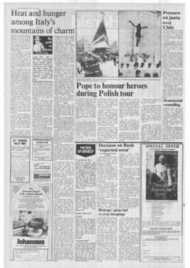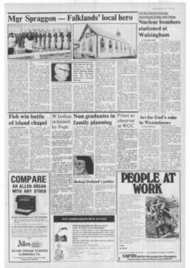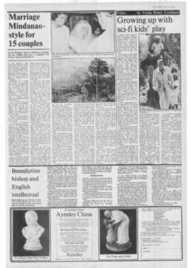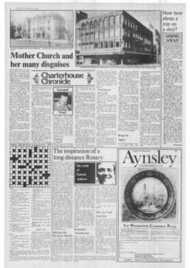Page 6, 17th June 1983
Page 6

Report an error
Noticed an error on this page?If you've noticed an error in this article please click here to report it.
Tags
Share
Related articles
Spirituality In Prison
Letters Shining Spirituality
Spiritual Books
Reviewers' Choice
Religious Books
The woman who could not die
Iulia de Beausobre: A Russian Christian in the West by Constance Babington Smith (Darton, I.ongman and Todd, £9.95).
THIS RATHER flat and deceptive title conceals the story of a truly remarkable woman, brave, humble, deeply spiritual, for much of her life a lone crusader with a message still deeply relevant to 1983, although she was 84 when she died in 1977. I am sorry I never met her, though I knew many of the people who were in her circle at the end of her life. I would have had much to learn from her, and had 1 been born twenty years earlier I might just possibly have been privileged to have shared her work on behalf of Christian Russia in the 1930s.
lutia de Beausobre's surname — that of her first husband conceals someone born into the most privileged sector of the Russian aristocracy. Yet, as it turned out, not a soul born in the milieu in the last few years before the Revolution could remotely be called "privileged". Suffering was her lot from a very early age. Even while a child she experienced the horror of seeing her family's country home burn down before her eyes. Through her first marriage to a Russian (of Huguenot origin) in the diplomatic service, she escaped the immediate terror of the Revolution, but she voluntarily went back from London to the Soviet Union with her beloved husband to a life of deprivation and terror. Nikolay perished in the camps; she survived them to be ransomed out of the USSR by her English former governess, after which this country became her home.
Many of the best pages in the book concern the Soviet Union, which is why I call the title "deceptive". Iulia's crusade of the thirties was to tell the story of Stalin's terror — one of the rare attempts to do so before the truth began to be revealed over 20 years later under Khrushchev. Most impressively, she even found a Christian message of hope in her suffering, having been a nominal Christian earlier and coming to the most profound faith through her experience. She interpreted the tragedy of Russia as this century's expression of the way of the cross.
Her book, The Woman Who Could Not Die, was published in 1938, not a propitious time for talking to the world about the horrors of the Soviet Union. Nevertheless, despite a weak body which never totally recovered its vigour after the camps, throughout a long life and during a short but happy second marriage to Sir Lewis Namier, she exercised a deeply spiritual influence for good on a loyal circle of friends. She always brought out the best in others, not least in the author of this book.
It is sad that A J P Taylor's autobiography, A Personal History, also just published, presents her with such lack of understanding for her true qualities, but this book gets the record straight.
The biography takes 116 pages, after which the last 67 consist of notes and scattered thoughts by lulia de Beausobre herself dating from the later part of her life. The two parts fit well together to make a gentle yet persuasive addition to the really worthwhile spiritual literature of our time. Constance Babington Smith writes well and the book is faultlessly produced by Darton, Longman and Todd, a pleasure to read in every respect.
Michael Bourdeaux
blog comments powered by Disqus











